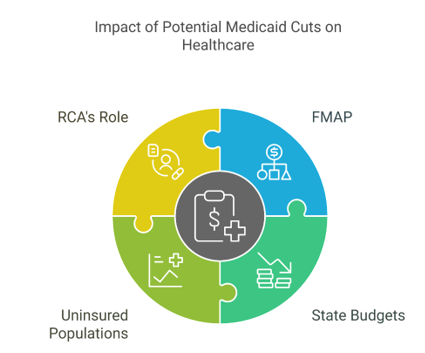
In the constantly evolving landscape of healthcare, the looming threat of Medicaid cuts stands to affect millions of Americans. As some federal lawmakers consider eliminating the enhanced Federal Medical Assistance Percentage (FMAP) under the Affordable Care Act (ACA), the ripple effect on Medicaid expansion states could be disastrous. Nearly 11 million people could lose coverage, and the financial burden on states could be staggering.
What is FMAP and Why Does It Matter?
FMAP, or Federal Medical Assistance Percentage, is the formula that determines the federal government’s share of Medicaid funding. The enhanced FMAP, which was introduced under the ACA, provides additional federal funding to states that expanded Medicaid eligibility. This enhanced funding was designed to support low-income individuals and families by ensuring that Medicaid remains accessible in states that opted into the expansion.
But what happens if the enhanced FMAP is cut? Well, this is where things get tricky.
Without the enhanced FMAP, states would face a significant shortfall in federal funding, requiring them to either find new revenue sources or cut back on Medicaid services. According to a February 2024 analysis from the Urban Institute and the Robert Wood Johnson Foundation, Medicaid expansion states would collectively need to find $44.3 billion in lost federal funding for 2025 alone. This amounts to an average spending increase of 25.6% per state. Some states, like North Dakota and Indiana, would face even higher increases—up to 46.9% and 39.7%, respectively.
This challenge would not only place immense strain on state budgets but also directly affect millions of low-income individuals who rely on Medicaid for essential healthcare services.
How Medicaid Cuts Could Lead to More Uninsured People
One of the most alarming effects of potential Medicaid cuts would be the sharp rise in uninsured Americans. If Medicaid expansion were reversed, states like New York, Kentucky, and Michigan could see their uninsured populations soar by more than 100%. In fact, New York alone would see a staggering 195.1% increase in its uninsured population. For states like Kentucky and Michigan, the impact would be almost as severe, with increases of 104.3% and 99.6%, respectively.
This sharp rise in uninsured individuals not only represents a loss of healthcare access for millions but also increases the pressure on emergency healthcare systems, which would need to absorb more patients without adequate funding. This could lead to overcrowded hospitals, longer wait times for care, and a potential decline in the overall quality of healthcare.
What Could Trigger These Changes?
The primary driver behind these cuts is a push to reduce government spending. The recent passing of a House Republican budget resolution, calling for $880 billion in savings from Medicare and Medicaid over the next decade, is a clear signal that changes to these programs are on the horizon.
Additionally, many states that expanded Medicaid under the ACA face significant financial challenges in making up for lost funding. States like New York, California, and Virginia would need to raise their Medicaid spending by nearly 30% or more to cover the shortfall, while states like North Dakota and Montana face even more drastic increases.
What Does This Mean for States and Healthcare Providers?
These potential cuts leave states in a difficult position. With healthcare costs rising and federal funds potentially being reduced or eliminated, many state governments will be forced to make tough decisions. For healthcare providers, the potential cuts could mean less reimbursement, which might lead to a reduction in services or longer waiting times for patients. For those who rely on Medicaid for health coverage, the reality of losing that safety net could lead to serious consequences for their health and wellbeing.
How RCA Can Help: A Use Case for Healthcare Providers
At Resource Corporation of America (RCA), we understand the complexities of navigating a changing healthcare landscape. With over 30 years of experience, we’ve built our reputation by helping clients in the healthcare industry adapt to economic shifts, regulatory changes, and funding cuts. If Medicaid cuts become a reality, RCA can help your organization manage the financial impact by optimizing your revenue cycle and finding ways to sustain operations.
Here’s how RCA can help:
- Compliance Assistance: With stricter eligibility requirements and changes to Medicaid policies likely on the horizon, RCA can help you navigate the complex regulatory environment. Our compliance experts will ensure your organization stays up to date with new rules, preventing costly penalties and disruptions in service.
- Cost Efficiency and Operational Optimization: We can help you streamline your operations, reduce waste, and find cost-saving opportunities to offset the impact of Medicaid cuts. From staffing adjustments to technological upgrades, RCA’s solutions are designed to help healthcare providers operate efficiently without compromising patient care.
- Strategic Planning: As state budgets tighten and federal funding becomes uncertain, RCA provides strategic planning services to help your organization prepare for the future. Our team will help you anticipate financial changes and develop plans to mitigate risks and capitalize on new opportunities.
Conclusion: A Collaborative Approach to Navigating Uncertainty
The proposed Medicaid cuts could create a seismic shift in healthcare across the United States, affecting millions of people who rely on the program. With states facing increased spending demands and millions at risk of losing coverage, the need for efficient operations and revenue management will be more crucial than ever.
At RCA, we have the expertise and experience to help healthcare providers navigate these turbulent times. By working with us, you can not only safeguard your organization’s financial health but also ensure that you continue to provide essential care to the communities you serve, even in the face of unprecedented challenges.
Let’s work together to create a resilient future for healthcare. Contact RCA today to learn more about how we can help you thrive, no matter what changes lie ahead.

Leave A Comment
You must be logged in to post a comment.